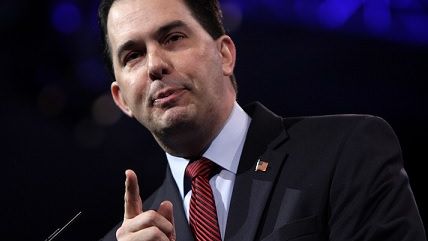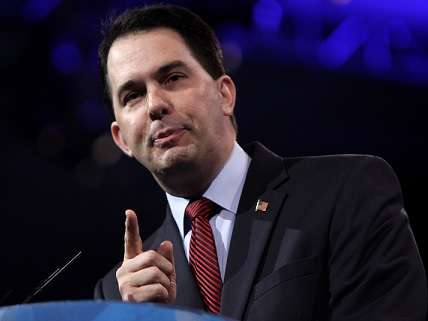Scott Walker's Turn to Beat the War Drums on Radical Islam
While earlier this week Rand Paul told voters if they're eager for war they should look elsewhere.


Scott Walker is scheduled to make a foreign policy address at the Citadel in South Carolina today. He will vie, as almost every other Republican presidential candidate has, to appear as toughest on "radical Islam" and most ready to take the country to war. More than four months from the first primaries and caucuses of 2016, this shtick is getting old. There are 17 Republican candidates and most of them match up on most positions; it's a contest lacking substance.
Here's how Walker starts, based on a text provided by his campaign:
"The United States faces some serious threats in the world today. There are some who would question whether our leaders are capable of rising to the challenges of our time and whether our country is capable of continued greatness. They suggest that our best days may have already come and gone.
"I do not share that view of America. You see the greatness of America is certainly not determined by the politicians in Washington who merely follow while others lead, or spend all of their days discussing a problem but never acting.
What? Walker says the greatness of America is not determined by politicians in Washington, but he's comfortable with those same politicians taking America to war. Because of the little guy. Walker continues:
"The future leaders of this exceptional country are sitting in this room—and in similar places across America. Those of you who will join the military, like others on the front lines today, at their posts around the world and across our services, you are modern day patriots."
The grunts will go and fight for America because they believe in its greatness, even though the politicians who don't determine that greatness are determining where the grunts are deployed to go to war, while their own asses are stapled to the desk.
And then comes the obligatory "truthtelling" about radical Islam:
"At the very least, you deserve a commander-in-chief who tells you the truth.
"And here it is: we are at war with radical Islamic terrorism. It will not go away overnight. This is a generational struggle. And these radical groups will continue to grow if we do not destroy them.
"Yes, the world is complex, but some things are simple: there is good and there is evil.
"America is a force for good in the world. Radical Islamic terrorists are agents of pure evil.
Maybe trying to be a third (or fourth, or fifth) term for George W. Bush will work better for Walker than it did for McCain in 2008. But if it'll work for any candidate, it'll probably work best for Jeb Bush. Virtually every Republican candidate has made a point to point out they will "tell the truth" about radical Islam. Then they call it a simple problem with a simple solution (like the post-9/11 War on Terror, the Afghanistan War, and the Iraq War were all supposed to be) that today's leaders don't have the fortitude to go through with. It's a weak argument based on tired rhetoric.
Even Rand Paul has used the talking point about "radical Islam" and the current administration's refusal to call the problem by its names, even as it has expanded the war on terror to target more and more radical Islamist groups around the world with only the most tenuous relationship to Al-Qaeda, the original enemy on which the legal justification for the war on terror was pinned.
At least Paul, unlike Walker and the other Republican candidates, understands, and has in the past stressed, the connection between interventionism and the boom times radical Islamists have enjoyed recently. The message has been muddled as Paul looks to make himself more attractive to Republican base voters. The effort's failed so far, with Paul dipping in the polls. Perhaps he is trying a different tack. At a rally in Seattle, Paul told the crowd, which reportedly included some Bernie Sanders supporters, that if they were "eager for war" he could recommend at least 10 other candidates. Differentiating himself from the rest of the field, rather than trying to appear as the best version of the generic establishment Republican most of the candidates are vying to be, seems like the more fruitful approach to finding new supporters.

Show Comments (38)